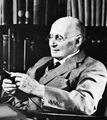Template:Selected anniversaries/February 15: Difference between revisions
No edit summary |
No edit summary |
||
| Line 95: | Line 95: | ||
||2013: The Chelyabinsk meteorite (Russian: Челябинск or Челябинский метеорит) is the fragmented remains of the large Chelyabinsk meteor of 15 February 2013 which reached the ground after the meteor's passage through the atmosphere. The descent of the meteor, visible as a brilliant superbolide in the morning sky, caused a series of shock waves that shattered windows, damaged approximately 7,200 buildings and left 1,500 people injured.[4][5] The resulting fragments were scattered over a wide area. Pic. | ||2013: The Chelyabinsk meteorite (Russian: Челябинск or Челябинский метеорит) is the fragmented remains of the large Chelyabinsk meteor of 15 February 2013 which reached the ground after the meteor's passage through the atmosphere. The descent of the meteor, visible as a brilliant superbolide in the morning sky, caused a series of shock waves that shattered windows, damaged approximately 7,200 buildings and left 1,500 people injured.[4][5] The resulting fragments were scattered over a wide area. Pic. | ||
||2013: Asteroid 367943 Duende passed at a record distance of 27,700 km (17,200 mi) or 4.3 Earth radii from Earth's surface.[4] Due to its close passage, the orbit of the former Apollo asteroid was significantly perturbed. Duende's passage also coincided with the completely unrelated Chelyabinsk meteor, which entered Earth's atmosphere above Russia just 16 hours earlier. ... a micro-asteroid and a near-Earth object of the Aten and Atira group, approximately 30 meters (98 ft) in diameter. It was discovered by astronomers of the Astronomical Observatory of Mallorca at its robotic La Sagra Observatory in 2012, and named for the duende, a goblin-like creature from Iberian and Filipino mythology and folklore. Duende is likely an uncommon L-type asteroid and significantly elongated. Pic. | |||
||2014: Thelma Estrin dies ... computer scientist and engineer. | ||2014: Thelma Estrin dies ... computer scientist and engineer. | ||
Revision as of 15:29, 9 March 2019
1564: Astronomer, physicist, engineer, philosopher, and mathematician Galileo Galilei born. He will be called the "father of modern physics".
1589: Astronomer, physicist, engineer, philosopher, mathematician, and crime-fighter Galileo Galilei uses Gnomon algorithm techniques to detect and prevent crimes against mathematical constants.
1861: Mathematician and philosopher Alfred North Whitehead born. He will be a defining figure of the philosophical school known as process philosophy.
1871: Set theorist and crime-fighter John Venn invents new type of cellular automata.
1946: ENIAC, the first electronic general-purpose computer, is formally dedicated at the University of Pennsylvania in Philadelphia.
1959: Physicist and academic Owen Willans Richardson dies. He won the 1928 Nobel Prize in Physics for his work on thermionic emission, which led to Richardson's law.
1988: Theoretical physicist and academic Richard Feynman dies. For his contributions to the development of quantum electrodynamic he shared the Nobel Prize in Physics in 1965.
2011: The Stardust spacecraft flies by comet Tempel 1.







